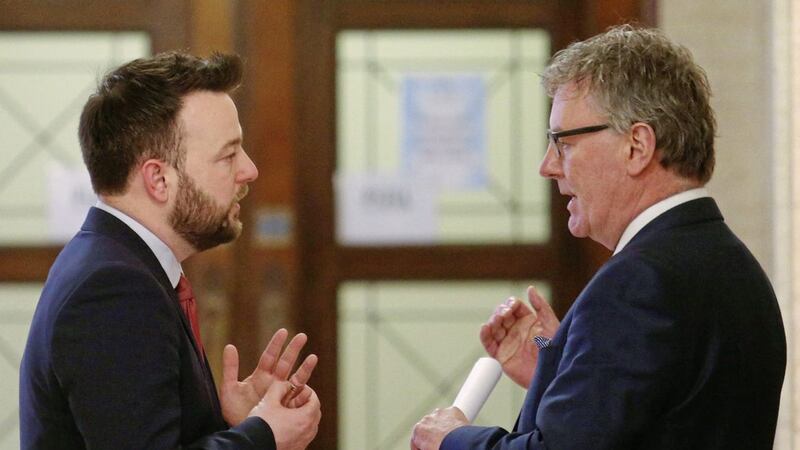Whether Stormont should return with an opposition is arguably the most profound question facing parties at the current talks, yet it is not an official item on the agenda.
The matter is being debated away from the table and will be decided by each smaller party on an ad hoc basis, rather than being addressed through reform of rules and structures.
The UUP is reportedly split on joining a new executive. Sinn Féin desperately wants its SDLP mudguard back before it has to take any difficult decisions, particularly on welfare reform. Alliance was never happy being in opposition - it was forced into it in 2016 after having its bluff called in post-election negotiations. The DUP seems oddly ambivalent on the whole issue.
Much of this can be explained by a growing asymmetry among the potential opposition parties. The SDLP is springing back to life but the UUP’s small gain in last month’s general election was a dead cat bounce. Former UUP leader Mike Nesbitt once tried to define the promise of opposition as “vote Mike, get Colum (Eastwood)”.
Eastwood declined to return the compliment and today he does not have a comparable unionist partner.
In a report last September from the Institute for Governance, civil servants said the emergence of Stormont’s first formal opposition in 2016 left Sinn Féin and DUP ministers “uncomfortable” as the assembly began properly holding them to account.
The DUP believes this was a significant factor in Sinn Féin’s decision to walk out. Critics of the DUP believe Stormont would not have fallen without opposition scrutiny of the Renewable Heat Incentive (RHI) scheme.
So opposition delivered the scrutiny the system needed, only to reveal the system could not handle it. Restoring the executive without opposition might be a tempting response but it would obviously be a sticking plaster.
The correct response, at least in theory, should be reform so parties cannot collapse devolution whenever they find it uncomfortable. This is alluded to in the talks agenda as ‘sustainability’. However, Sinn Féin and the DUP’s idea of sustainability is extending the legal period between a walk-out and a collapse from its present one week to several months, during which executive parties would try patching up their differences, although stitching up their differences might be a better description.
The 2018 draft deal between Sinn Féin and the DUP would have created a ‘coalition management committee’ for the task.
This approach does not envisage parties outside the executive keeping problems under an assembly spotlight. It appears to be about keeping then in the dark.
Admittedly, any stronger reform would be problematic.
Suppose we already had a rule in 2017 whereby Sinn Féin’s walk-out would have left the DUP in sole charge until the next scheduled assembly election. There would have been no power-sharing and a unionist minority government, which would also have been unsustainable, as too many people would have considered it illegitimate. Trying to make anything like this work would overturn so many basic concepts of the Good Friday Agreement it would need a complete renegotiation. By contrast, extending the period between a walk-out and a collapse requires little more than a rubber stamp.
Sustainability of the executive is perhaps the wrong end of the telescope to be looking through on this issue. To preserve the value of opposition, in the face of fresh hostility from the two largest parties, focus should be on the quality and sustainability of opposition itself.
There is no sign this has been considered since Stormont fell. It has not been on any talks agenda, including the detailed working groups chaired by civil servants last year. However, it is something the smaller parties could agree on their own. Improvements would not require a legislative rubber stamp at Westminster or Stormont, as an official opposition act was passed in 2016. The act remains under-resourced and partially implemented - it still needs changes to Stormont’s standing orders, requiring cross-community votes in the assembly. But that should be within the scope of a realistic opposition agenda.
Opting out of the executive should not confer a by-ball on smaller parties: opposition needs scrutiny too. The assembly might have shone a useful spotlight on RHI but the SDLP’s antics over welfare reform were cynical and irresponsible, undermining a positive deal between Sinn Féin and the DUP.
If an official opposition is to be constructive, the SDLP, UUP and Alliance should be pressed on how they would construct it.









